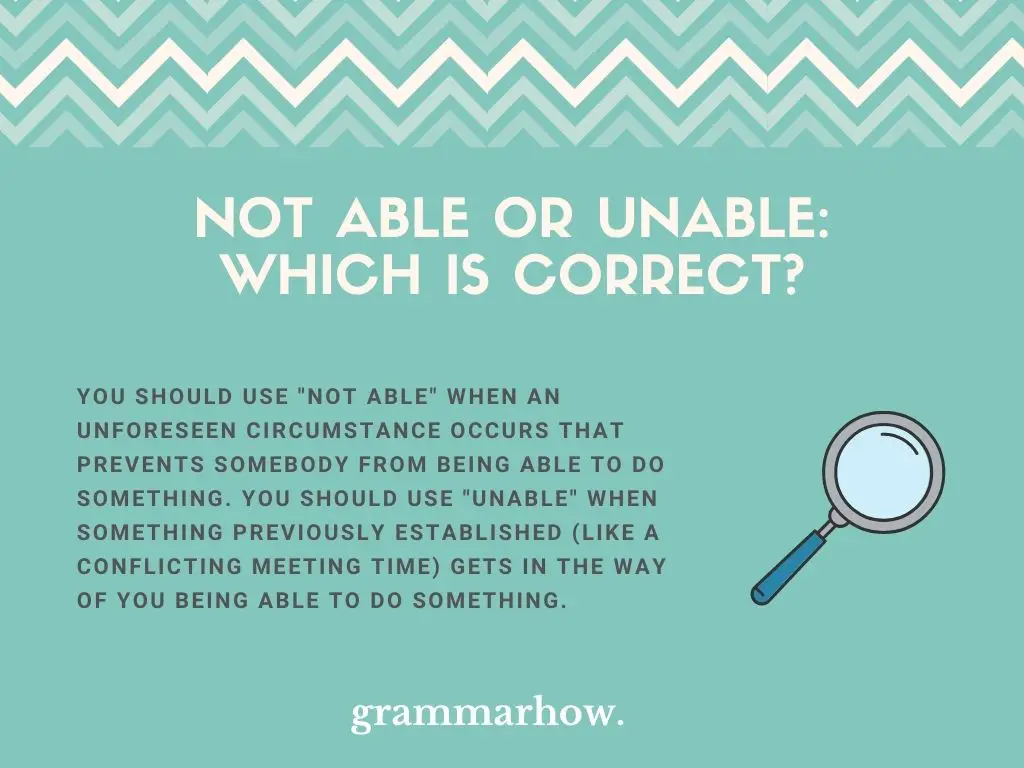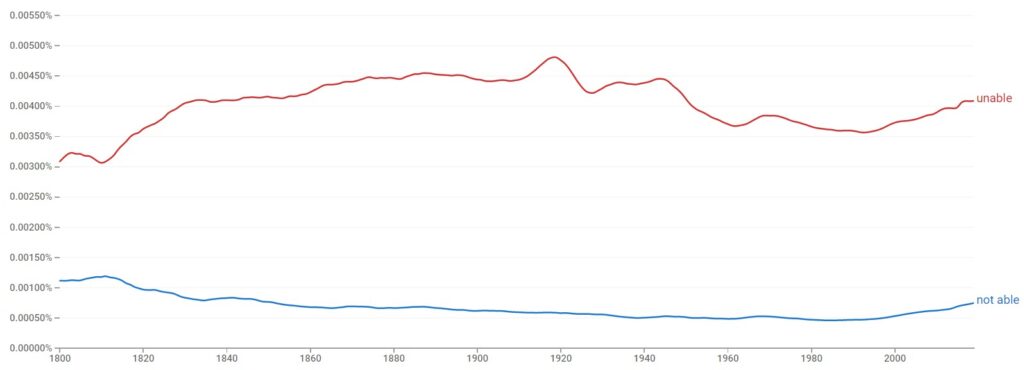The meanings of “not able” and “unable” are very similar. There are slight differences that we can highlight, but you’ll be okay to use them synonymously for the most part. This article will explain what those differences are and how to use them.
Not Able Or Unable: Which Is Correct?
You should use “not able” when an unforeseen circumstance occurs that prevents somebody from being able to do something. You should use “unable” when something previously established (like a conflicting meeting time) gets in the way of you being able to do something.

The definition of “unable,” according to The Cambridge Dictionary, is “to not be able to do something.” We mostly use it when something else conflicts with the time when something was arranged.
What Does “Not Able” And “Unable” Mean?
Both of these words have a very similar meaning. If we were to ignore the information we shared with you above, we’d be able to define them both in the same way.
“Not able” and “unable” both mean that someone wasn’t able to do something. “Not” and “un-” are the opposite of the word that follows them.
In any case, “not able” and “unable” both mean that something stopped someone from doing something. We can go slightly further to allow ourselves to differentiate them.
“Not able” means that an unforeseen or unstoppable circumstance occurred that prevented us from doing something. This could mean we got caught in traffic or we had an accident of some kind that stopped us from doing something.
“Unable” means that we’ve had a conflicting schedule or preexisting condition that means we aren’t able to do something. This could mean that we had a business meeting planned in the time slot or that we’ve previously injured ourselves and can’t partake in the upcoming activity.
Is “Not Able “Or “Unable” Used The Most?
The two words are very similar, so it’s good to know which is most popular. Generally, the more popular a word is, the more likely you are to come across it when talking or writing to native speakers.
According to Google, “not able” is mentioned 16,200 times on The New York Times website, while “unable” is mentioned 133,000 times.
Also, according to this graph, “unable” is by far the most popular choice of the two. It’s rare that “not able” ever gets mentioned in written English (which this graph showcases).

“Not able” is much less common, which is why we talk about how similar they are. Most people won’t note the difference we’ve mentioned previously and will simply use them both to mean the same thing. If you’re going to do that, then “unable” is always the correct choice.
Can “Not Able” And “Unable” Be Used Interchangeably?
“Not able” and “unable” are interchangeable. You can use them to mean the same thing, and no native speaker is going to tell you that you’re wrong for doing so.
The meaning of both is that someone is not able to do something. For this reason, whether we use “not able” or “unable” is irrelevant. The only defining factor is that “unable” is by far the more popular choice among native speakers, so it’s more likely to be the one you use.
Examples Of How To Use “Not Able” In A Sentence
For the purposes of this article, we want to draw your attention back to the meaning we spoke about. “Not able” is used to refer to unforeseen circumstances that arose that prevented somebody from being able to do something.
We want to share some examples with “not able” and this meaning so you can understand what we’re talking about. Also, you’ll be able to use it more appropriately yourself.
- I was not able to attend the party because my car broke down.
- I am not able to come later because I’ve just fallen off my bike.
- I am not able to make it, I’m really sorry, but something has come up.
- I was not able to see her because she left unexpectedly.
- We were not able to attend because our house caught fire.
Examples Of How To Use “Unable” In A Sentence
Now let’s go over using “unable” with the meaning we’ve spoken about throughout this article. It’s more common to use “unable,” so you’ll find most of these are more relatable than the “not able” examples.
“Unable” means that there is a conflict of some kind that stops us from being able to do something. Usually, that conflict has already been determined and isn’t an unexpected thing.
- I am unable to come to the wedding because my ex is there.
- I was unable to do the things I wanted to do because I broke my arm before going.
- We were unable to help out because we were busy with work.
- I was unable to attend the meeting with my boss because I already had a meeting with another company at that time.
- I was unable to help out because I couldn’t leave her alone.
When Should I Use “Can’t” Instead Of “Unable” Or “Not Able”?
You should use “can’t” instead of “unable” or “not able” when it is impossible to do the thing that you’re talking about. “Unable” means you’re not able to do something at this moment, while “can’t” means you’ll never be able to do that thing (with your present knowledge).
- He is unable to swim.
- He can’t swim.
“Unable” shows that “he” is not able to swim right now, though he is likely capable of swimming. It might be that he is injured or doesn’t want to swim at that time.
“Can’t” shows that “he” doesn’t know how to swim. It’s impossible for him in the current circumstances to swim, even if he wanted to.
“Not Able” And “Unable” – Synonyms
Finally, let’s see what alternatives and synonyms there are for the two words. We find these helpful when we’re trying to define the differences between words like this, so take your pick from the following.
- Unavailable
- Incapable
- Lacking the ability
- Powerless
- At a loss
You may also like: “Unavailable” vs. “Not Available” – Difference Explained (11 Examples)

Martin holds a Master’s degree in Finance and International Business. He has six years of experience in professional communication with clients, executives, and colleagues. Furthermore, he has teaching experience from Aarhus University. Martin has been featured as an expert in communication and teaching on Forbes and Shopify. Read more about Martin here.
